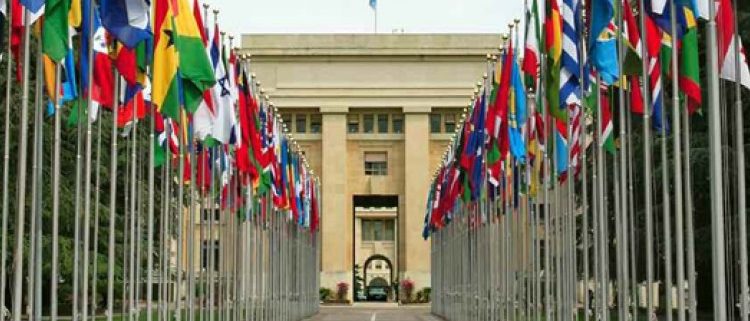Discussions in Argentina regarding a treaty between businesses and human rights.
The Director of Human Rights of the Minister of Foreign Affairs’ office welcomed Civil Society representatives to discuss Argentina’s position in the next session of the United Nations Human Rights Committee.
Last Monday, the General Director of Human Rights of the Ministry of Foreign Affairs’ office, the minister Federico Villegas Beltrán, welcomed a Group of representatives from different organizations of the civil society to discuss actions Argentina will be taking in the next session of the United Nations Human Rights Committee.
Throughout June, the United Nations Human Rights Committee will receive reports carried out by the Advisory Committee on Human Rights and Businesses and will debate the possibility of moving towards an international document that will regulate the responsibility of businesses in terms of human rights. Together with a coalition of organizations, FUNDEPS sent the Minister of Foreign Affairs Hector Timerman a letter requesting that in the next committee sessions the production of an international treaty on the matter be endorsed.
At the moment, numerous commercial businesses are directly or indirectly connected to a series of abuses and violations of human rights in different parts of the world. In addition, there is a strong preoccupation for the way in which the rights of the most vulnerable are seen to be affected: women, young people, underprivileged, farmers and indigenous towns, girls and boys amongst others. There has also been an increased amount of registered attacks, persecutions, intimidations and restrictions of the defenders of these rights, as well as members the organizations in the civil society, such as syndicates and representatives from indigenous towns.
In the UN’s framework, the link between businesses and human rights finds itself regulated by three fundamental pillars: the right to protection from the state when faced with abuse committed by third parties, the right for the business to respect them and their corresponding responsibility, and the victims’ access to justice, in order to achieve an effective reparation. On top of these pillars, they have developed the Guiding Principles and other guidelines such as the OECD guidelines and the framework of sustainability and IFC’s performance standards.
These types of guidelines do not only appear in autonomous regulations but in surrounding laws as well, defending consumers, labour policies and fighting against corruption. Nevertheless, Studies show that although there are a wide range of guidelines that directly or indirectly regulate the right to company due diligence, in practice they do not implement it or do not fully apply themselves.
The Treaty Alliance
Facing this panorama is a movement that demands the rise of the level of commitment, developing the guiding principles of 2011 into a binding treaty regarding company responsibility in Human Rights. A treaty that can guarantee that the obligations surrounding Human Rights are applied to company procedures, much like admonitory obligations and regulation of corporations, provide effective solutions for those who are affected by violations by the businesses and to create international mechanisms of control and implementation. The Treaty Alliance has elaborated a declaration in this sense, which has already been signed by more than 400 organizations in the civil society, amongst them some who have gotten drawn up formal communication with the Minister of Foreign Affairs of Argentina.
The Minister of Foreign Affairs’ view
During the meeting, Minister Federico Villegas Beltrán protested in favour of the benefits that an instrument such as that that is being demanded could yield. Argentina is a pioneer in this matter and is producing advanced jurisprudence in that regard with the last trials on company responsibility in crimes against humanity; such is the case of the sugar factory Ledesma or the motor companies Ford and Mercedes Benz. Nevertheless, the minister showed caution and mentioned the importance of establishing progressive objectives, which allow the achievement of a consensus between the countries where the headquarters of the majority of the big companies are gathered.
All in all, Argentina’s participation in the council meeting will work to achieve the necessary consensus in order to raise the level of commitment of the states with the Guiding Principles. From FUNDEPS, we will continue working to promote the establishment of legal frameworks that make human rights a requirement not only facing the States but also facing institutions like companies whose power and impact has recently grown.
Translated by: Nailah Carr



